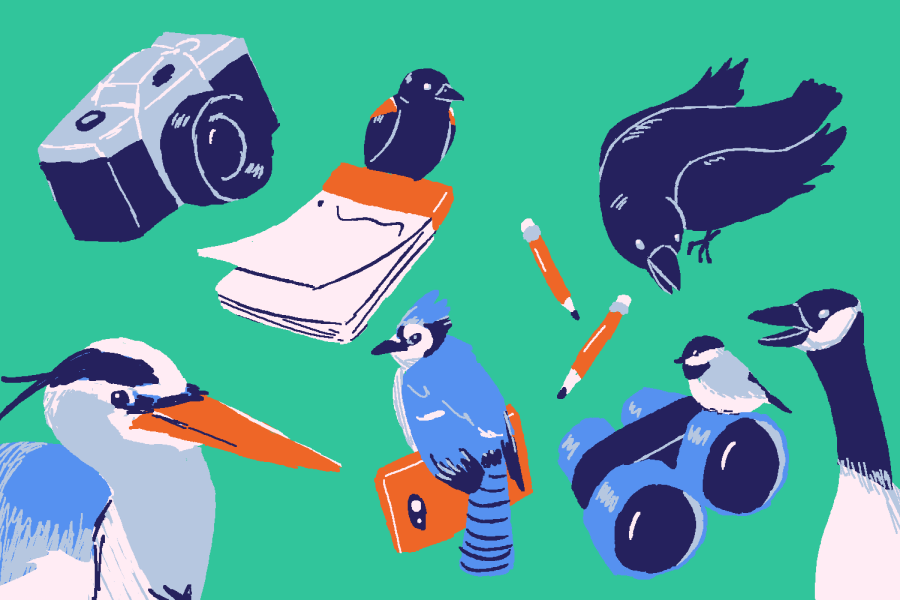Inclusive Birding Club can provide comfort
Columnist Lucy Atkinson suggests looking into birding as a possible hobby to help relieve stress and other mental health situations.
February 20, 2023
Bouncing amongst leafy tree-tops, swirling in sky-filling dances, or strutting with purpose across campus sidewalks, NIU’s more feathery residents lack no vitality. For any in need of a new hobby, the Inclusive Birding Club offers uniquely fulfilling opportunities.
Undeniably delightful, there is value in birding simply for the fascinating sights birds present. The sight of one species may bring a moment of joy to a day that would otherwise be gray, while another may induce feelings of awe, even personal modesty.
However, for college students with mentally stressful and draining lives, spending a small bit of one’s time observing feathered-friends offers rewards beyond the beauty of the avian world as well.
Andrew Dreelin, a third-year ecology, evolution, conservation and behavior PhD student, founded the Inclusive Birding Club with his colleagues in 2020 and currently serves as its president. A student-birder for many years, Dreelin’s experience has taught him that one of the most powerful benefits of birding is the mental well-being it fosters.
“Birding is inherently a kind of mindful activity, because you’re focusing on something outside of yourself,” Dreelin said. “And it’s really easy and fun to kind of get, like, a relaxed state where… while you’re birding you forget everything else…The more I go birding, the calmer I feel.”
Secretary of the Inclusive Birding Club and first-year geology masters student Rye Cox elaborated on this idea, attributing a healing capability to birding through the simplicity it offers.
“We live in a very technology heavy world, we live in a very – at least in my perception – indoor world…and that can be pretty draining sometimes. And it’s, I think, immensely important to… go out in nature… (because) literally everything else, you know, just kind of drops off,” Cox said. “Just in this experience of birding, you’re just going out. We’re in a space that is welcoming. There’s no expectations on you. The only job you have is to exist.”
Beyond mindfulness, Dreelin and Cox also emphasized birding’s role in facilitating concentration, social cooperativeness and gratitude. Yet perhaps what makes birding especially special is that it requires nothing from those who choose to do it.
In fact, as its name suggests, one of the Inclusive Birding Club’s main objectives is to create a fully welcoming, non-judgemental and diverse space.
In May 2020, the club was founded amidst a larger response by birding communities to the false police report filed against Christan Cooper, a Black birder and science writer.
“The response of the birding community to that – doing great events like Black Birders Week and just pushing for diversity and inclusion in the field while recognizing the systemic barriers that folks face. We just wanted to do our part too, you know, push that culture of change forward,” Dreelin said.
As a member of the LGBTQ+ community, the club’s inclusivity was one reason Cox stepped forward to fill the secretary position. He adored its sweetly simple idea of all people coming together to love and appreciate birds.
“I’d always wanted to do birding. I’m a queer individual, I identify as bisexual. So, you know, having inclusive spaces is always something very important to me. So, I saw ‘Inclusive,’ I saw ‘Birding,’ I said ‘Tell me more,’” Cox remembered.
Unlike people, birds harbor no twisted prejudices, and the act of admiring them requires no prior expertise. In fact, Dreelin and Cox are eager to expand their organization and encourage any student with a love for nature to join.
Whether you can identify a species by sound or whether all you know is that the notes of early morning birdsong bring you bliss, birding teaches that there is gold to be found in life’s simple things.
Even when classes are at their most chaotic and peace seems to be a fantasy, we still rest on Earth, we still have skies and we still have birds. In the glums of February, chick-a-dees still twitter, wax-wings still munch on berries and geese still leave muddy, webbed footprints outside classroom windows.
With unyielding persistence, life continues to bubble around us. For those who stop to watch, it offers a special reward: preening away lingering stresses and soothing the soul.



